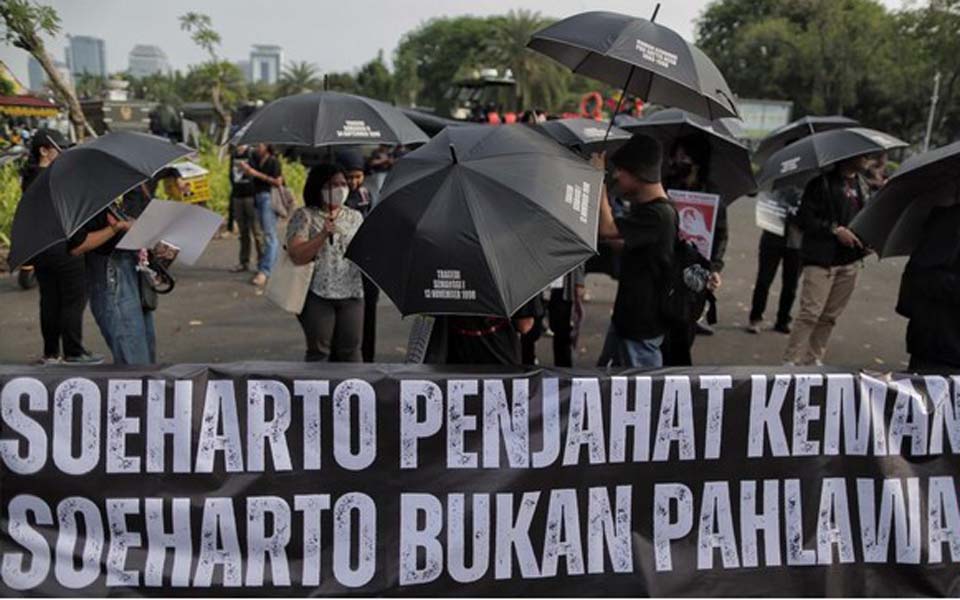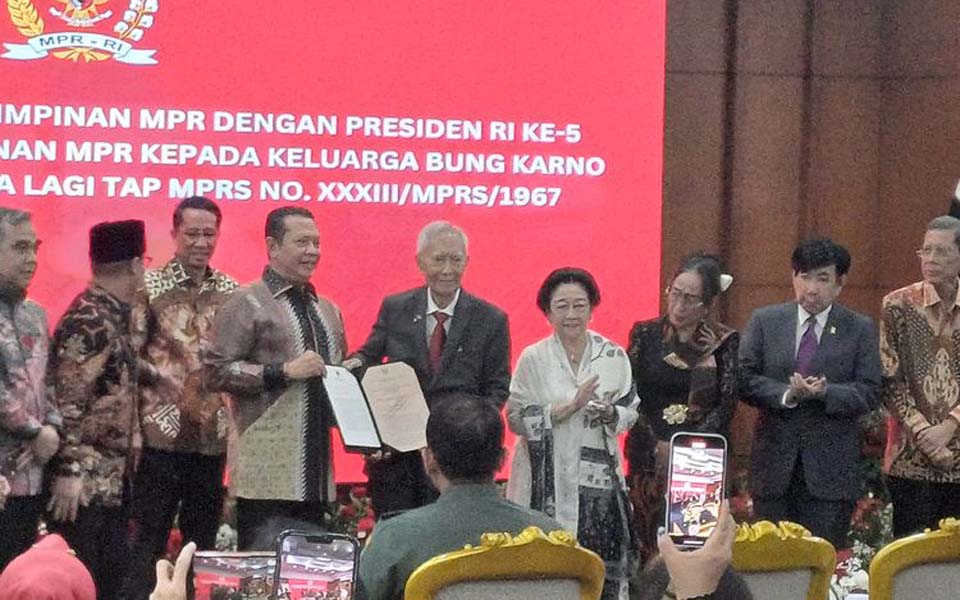Abraham Utama – The Indonesian Military (TNI) says that it will not changes its policies or views on the September 30 Movement (G30S) in 1965 regardless of the release of 39 secret US documents that have been opened to the public and “reveal a number of new facts”.
TNI Information Centre chief Major General Wuryanto said that the secret documents released by the US National Archives and Records Administration (NARA) cannot change the facts revealed by the Extra-Ordinary Military Tribunal (Mahmilub) trials held between 1966 and 1978.
“We will continue to adhere to the guidelines of the Extra-Ordinary Military Tribunal and the historical testimonies at the time”, Wuryanto told BBC Indonesia on Tuesday October 17.
Over a period of 12 years following the G30S, the government held at least 24 military tribunals to try senior Indonesian Communist Party (PKI) officials who were accused of being behind the planed coup d’etat and murder of six Army generals.
The accused in the trials included, among others, Air Force Vice Admiral Omar Dani, [former Foreign Affairs Minister] Soebandrio, Sjam Kamaruzzaman [believed to be a PKI operative working in army circles] and [presidential guard commander and G30S leader] Lieutenant Colonel Untung. All of the accused were found guilty.
Wuryanto also denied that the TNI in 1965 had supplied logistics to Islamic mass organisations or para-military groups to support the mass killing of PKI members and sympathisers.
In a telegram dated November 26, 1965 from a staff member at the US Embassy in Surabaya, East Java, to the US Secretary of State, it notes that “Civil guards or civilian security personnel from Kediri [in East Java] have been provided with arms in order to confront those accused of being communist”.
“It was a spontaneous act by society. If the TNI had funded it, where did the funds come from? The whole situation at the time was complex and difficult”, said Wuryanto.
One of the facts revealed by the declassified documents released this week was the possibility of providing assistance to the TNI in its confrontation with the PKI.
On October 23, 1965 the political advisor to the US Navy’s Central Command for the Asia Pacific Region (CINPAC), Norman Hannah, sent a letter to the US Ambassador to Indonesia, Marshall Green.
In the letter Hannah requited a statement by Green that the Indonesian military authorities will communicate with the US if they do indeed need assistance in confronting the PKI.
Hannah said, “I suspect that this assistance could possibly be in the form of covert operations and direct assistance such as transportation, money, communication equipment or weapons”.
Meanwhile Muhammadiyah Youth chairperson Dahnil Anzar Simanjuntak said that the different parties should not equivocate about these new facts surrounding the 1965 affair.
Muhammadiyah, the second-largest Islamic mass organisation in Indonesia after the Nahdlatul Ulama, was also cited in one of the secret US documents.
“These facts are a lesson, so they don’t need to be covered up or negated. There’s no need. As long as it can be debated out academically, there isn’t any problem”, said Dahnil.
In a telegram from the US Consulate in Medan, North Sumatra, to the US Embassy in Jakarta dated December 6, 1965, it says that Muhammadiyah has “instructed its members to kill people who are linked with the PKI”.
“PKI members are categorised as infidels, killing them is being treated as being the same as slaughtering a chicken”, the document reads.
Dahnil admitted that he does not know exactly what instructions were issued by Muhammadiyah in relation to the execution of communist groups. Nevertheless, he said, the atmosphere following the 1965 affair was indeed very tense.
The coordinator of the International People’s Tribunal into the 1965 affair (IPT 65), Nursyahbani Katjasungkana, believes that the release of the 39 secret US documents offers an “opportunity for the government to revise [its official] history”.
According to Nursyahbani, up until now the government has “closed its eyes” to information about the 1965 affair, whether it be the views of the victims or from researchers and overseas observers.
“The state denial has been very strong, as if they don’t want to hear the voices of the victims, particularly the research results. The government absolutely does not want to look into it”, she said.
Nursyahbani is pessimistic however that there will be a resolution or reconciliation of the 1965 affair in the near future. She bases this opinion on the attack by an anti-communist mob on the Jakarta Legal Aid Foundation (LBH) in late September. The attack was based on accusations that the LBH was holding a communist seminar.
“The attack was a step back because the government just allowed the mob to run wild. Jokowi [President Joko Widodo] himself has said that if the PKI is revived, just clobber them. It was precisely these words that were mimicked by the demonstrators at the LBH”, she said.
Bradley Simpson, the director of Indonesian and East Timor studies at the University of Connecticut, plans to hand over a compilation of the 39 declassified documents to the Indonesian National Archives and the National Library.
Simpson says that the Indonesian government should use the compilation as key materials to resolve the 1965 affair which he says has dragged on for too long.
“I hope that these documents will be able to push civil society in Indonesia to demand that the government accept these new facts related to the [1965] affair”, he told BBC Indonesia.
Prior to NARA releasing the declassified documents, in 2015 the US Central Intelligence Agency (CIA) published a report by their agents in Jakarta on the same subject. The report released by the spy agency contained data and predictions on the most probable outcomes following the G30S affair.
Since the reformasi era following the overthrow of Suharto, research in the form of both books and documentary films have come out contradicting the government’s version of the 1965 affair. Most of these works have been banned or persecuted when presented to the public.
On several occasions public screenings of the films Jagal (The Act of Killing) and Senyap (The Look of Silence) by award winning US filmmaker Joshua Oppenheimer have been forcibly closed down by certain social organisations (ormas).
The Attorney General’s Office banned the circulation of the 2006 book A Pretext for Mass Murder: The September 30th Movement and Suharto’s Coup d’Etat in Indonesia by John Roosa. The book contained facts about the G30S based on documents by Western countries.
In April 2016, a government-sponsored National Symposium on 1965 which was initiated by, among others, retired TNI general Agus Widjojo and Presidential Advisory Board member Sidarto Danusubroto, brought together the children and grandchildren of revolutionary heroes and senior PKI figures. Both parties agreed to resolve the 1965 issue through mutual forgiveness.
A month later a number of social organisations and retired generals held a counter symposium. They insisted that the PKI was the party that was most responsible for the 1965 affair.
Meanwhile the Coordinating Minister for Security, Politics and Legal Affairs, Wiranto, said at the time that the government planned to establish a National Reconciliation Council as a vehicle to resolve past human rights violations.
[Translated by James Balowski. The original title of the article was Dokumen rahasia AS soal Peristiwa 1965 diungkap, TNI ‘tak akan ubah sejarah’.]















